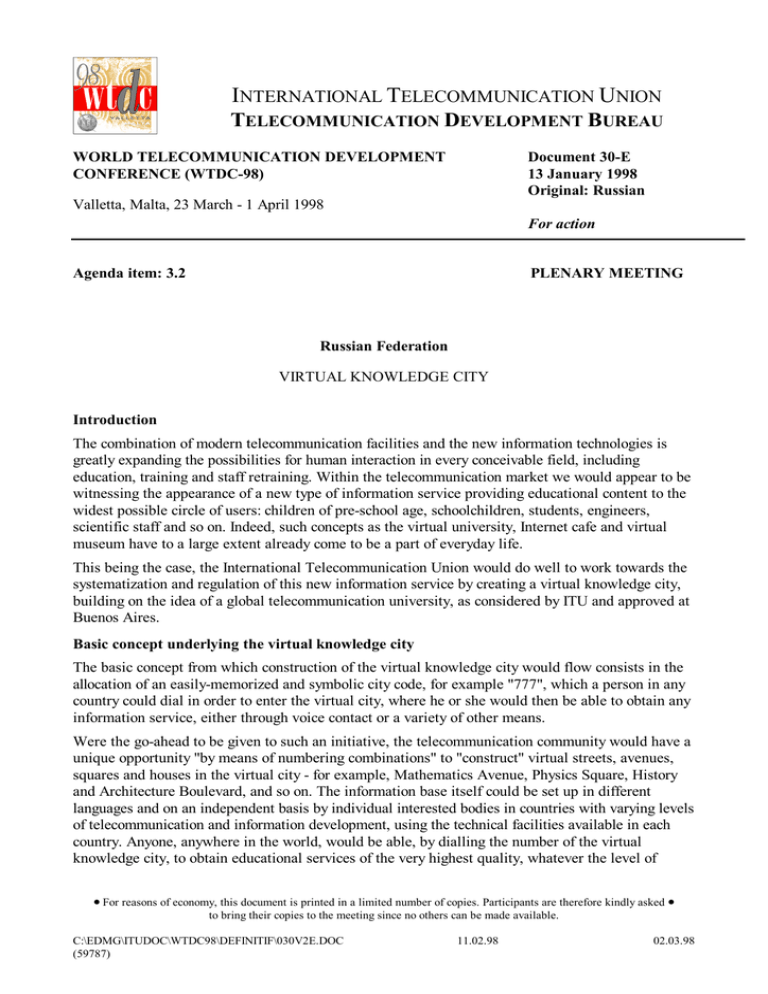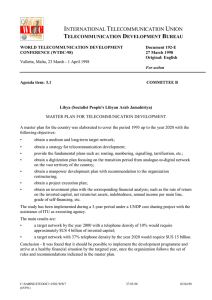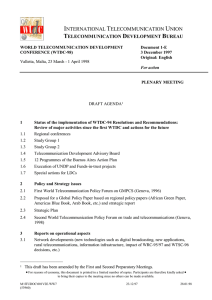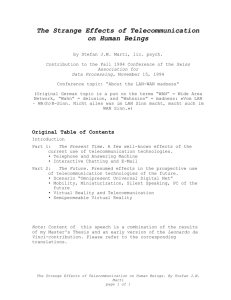I T U D
advertisement

I NTERNATIONAL TELECOMMUNICATION UNION TELECOMMUNICATION DEVELOPMENT BUREAU Document 30-E 13 January 1998 Original: Russian WORLD TELECOMMUNICATION DEVELOPMENT CONFERENCE (WTDC-98) Valletta, Malta, 23 March - 1 April 1998 For action Agenda item: 3.2 PLENARY MEETING Russian Federation VIRTUAL KNOWLEDGE CITY Introduction The combination of modern telecommunication facilities and the new information technologies is greatly expanding the possibilities for human interaction in every conceivable field, including education, training and staff retraining. Within the telecommunication market we would appear to be witnessing the appearance of a new type of information service providing educational content to the widest possible circle of users: children of pre-school age, schoolchildren, students, engineers, scientific staff and so on. Indeed, such concepts as the virtual university, Internet cafe and virtual museum have to a large extent already come to be a part of everyday life. This being the case, the International Telecommunication Union would do well to work towards the systematization and regulation of this new information service by creating a virtual knowledge city, building on the idea of a global telecommunication university, as considered by ITU and approved at Buenos Aires. Basic concept underlying the virtual knowledge city The basic concept from which construction of the virtual knowledge city would flow consists in the allocation of an easily-memorized and symbolic city code, for example "777", which a person in any country could dial in order to enter the virtual city, where he or she would then be able to obtain any information service, either through voice contact or a variety of other means. Were the go-ahead to be given to such an initiative, the telecommunication community would have a unique opportunity "by means of numbering combinations" to "construct" virtual streets, avenues, squares and houses in the virtual city - for example, Mathematics Avenue, Physics Square, History and Architecture Boulevard, and so on. The information base itself could be set up in different languages and on an independent basis by individual interested bodies in countries with varying levels of telecommunication and information development, using the technical facilities available in each country. Anyone, anywhere in the world, would be able, by dialling the number of the virtual knowledge city, to obtain educational services of the very highest quality, whatever the level of •For reasons of economy, this document is printed in a limited number of copies. Participants are therefore kindly asked • to bring their copies to the meeting since no others can be made available. C:\EDMG\ITUDOC\WTDC98\DEFINITIF\030V2E.DOC (59787) 11.02.98 02.03.98 -2CMDT98/30-E complexity desired. Where necessary, governments, organizations and funding institutions could sponsor the telecommunication operator services provided for people dialling the number of the virtual knowledge city, thereby providing a social service in the field of education. Clearly there are many advantages to the proposed initiative, which would draw together and unify such concepts as virtual educational establishments, information bases and inquiry and information services. Questions for study and elaboration 1) Selection of the three-digit code for the virtual knowledge city. 2) Configuration of the virtual knowledge city and development of its layout based on allocation of an appropriate numbering capacity. _______________ C:\EDMG\ITUDOC\WTDC98\DEFINITIF\030V2E.DOC (59787) 11.02.98 02.03.98


